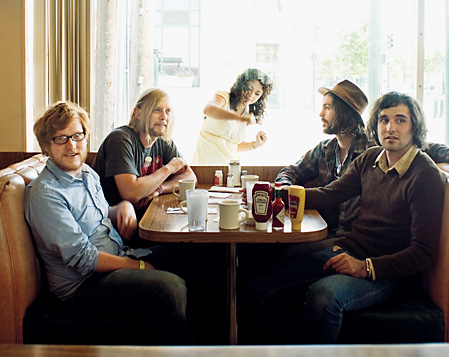2008 was a historic year for Van Pierszalowski, singer and songwriter for Port O’Brien. For the first summer in his life, Pierszalowski didn’t join his family on Kodiak Island, Alaska, where he usually works the season on his father’s salmon boat. Cambria Goodwin, also a singer and songwriter for the waterlogged folk-pop band, wasn’t at her mainland cannery gig, either. They’ve got a good excuse, though. Port O’Brien’s “I Woke Up Today,” from the band’s self-released second album All We Could Do Was Sing, is getting a lot of attention.
Recorded in summer ‘07 prior to Pierszalowski’s last Alaska sojourn, All We Could Do is equal parts string-band hootenanny, woozy sing-along and meditative balladry. Acoustic instruments dominate, but the album also indulges in lush strings and the occasional fuzzed-up electric growler, firmly rooted by bassist Caleb Nichols (who was recently replaced by Ryan Stively) and drummer Joshua Barnhart. While Pierszalowski’s romantic muse sometimes lends a high sentimentality to his lyrics, the band’s clanky, unscripted musical performances anchor the proceedings.
Pierszalowski and Co. began riding a wave of word-of-mouth buzz in 2007 when M. Ward wandered into a Port O’Brien gig in San Francisco and recommended the band to Conor Oberst, who quickly tapped it to open for Bright Eyes at the city’s venerable Great American Music Hall. Suddenly, Port O’Brien was getting enough work that the Kodiak Island salmon industry needed extra hands this season. All We Could Do manages to trap a small part of that solitary culture on tape. The album’s only non-studio recording is short closer “Valdez,” cut by Pierszalowski in a skiff in Alaska on a cheap cassette recorder. The hard water sloshing in the bilge provides a solemn, offbeat counterpoint to the fragile melody.
“Working out on the skiff, away from the main boat, it’s impossible to describe how isolated that feels,” says Pierszalowski. “My dad’s installed a satellite phone, so it’s easier to contact each other, but you get to a point where you become so intimately familiar with your own head that it becomes hard to communicate when you’re around people again. When we dock for a few days, it’s like you can’t even make yourself understood. It’s incredibly frustrating.”
That sense of isolation and communication breakdown permeates All We Could Do, whose primary themes are loneliness and the desire to live a settled life in the midst of unsettled work. This isn’t an LP about the convivial beach or the romantic shore. The album’s images are derived from the vast sea, from things in life that feel as vast as the sea: deep and murky, boiling with oddly shaped life beneath the surface.
“I’ve been coming [to Kodiak Island] all my life,” says Pierszalowski. “I know this area, every bay, every rock formation. I know which tides are best for fishing in which parts of the island. People talk about that element of the music like it’s a storytelling device or something, like the Decemberists’ thing. But to me, this is the way that talking about the world makes sense.”
—Eric Waggoner







